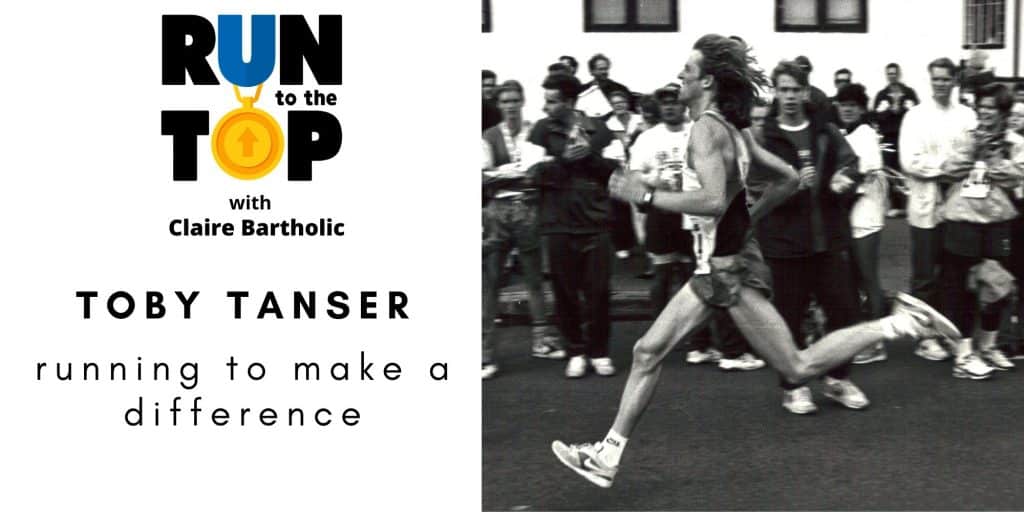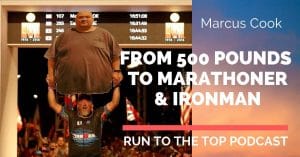
How did a nordic athlete wind up living and training in Africa and becoming a huge philanthropist? Toby Tanser, the founder and CEO of Shoe4Africa, which has evolved from providing Kenyan athletes with running shoes to a charity focused on health, education, and women’s empowerment, and which built the first public children’s hospital in East and Central Africa, tells Coach Claire how it all got started.
In this inspirational episode, Toby also talks about his experiences in Kenya, including differences between Kenyan and Western attitudes towards running, and offers up some training tips as well. He discusses his “cult classic” book Train Hard, Win Easy: The Kenyan Way, not to mention he literally wrote the book on the New York City Marathon. He has a great take on what makes the NYC marathon unique.
In addition to his philanthropy, coaching, writing, and running, Toby has sat on the New York Road Runners Board of Directors since 2002, was on the Achilles Track Club Board for six years before moving up to the Vice President of Achilles International in 2011, and is on the Coaches Advisory Board for Runner’s World.
Toby has many other achievements under his belt, but more than anything, he shows us how one person can make a huge difference in the world.
Questions Toby is asked:
2:27 You are a philanthropist, a coach, an author, a writer, and a former professional athlete. What roles of these have been your favorite?
2:58 Tell us a little bit about your charity, Shoe4Africa. How did it start and what is its mission?
3:59 Where has Shoe4Africa grown in the last 25 years?
4:34 It’s not just runners that you’re helping; it’s everyone?
5:20 Do you still go to Africa and run with people there?
6:11 You’ve also written several books about running and one of them is Train Hard, Win Easy: The Kenyan Way. I’d love to hear the story behind that book and some of the main training tips.
7:38 What are some of the tips you learned about how Westerners and Kenyans train differently?
10:52 How have things changed in the past 25 years in Kenya?
12:34 I think you’ve seen that in America nowadays people are learning from the Kenyans, and there are so many more group running programs out there as far as at the elite level. You have all sorts of training groups that you really didn’t see before, and it seems to be kind of based on the Kenyan model, don’t you think
13:48 It’s said that the Kenyans really take their jogging seriously too, which Westerners sometimes have a problem with. Can you talk about how they run easy?
17:11 You were on the board of directors for the New York Road Runners and the New York City Marathon for 15 years. Can you tell me a little bit about that experience?
18:56 Tell me a little bit about the New York City Marathon. You’ve written a book on it, so I’m sure you know a lot about it. Can you give any tips, any experiences about the marathon there?
21:06 How many times have you run it?
23:04 And after that day running the marathon for charity, pretty much that has been your whole life is running for charity in a sense?
24:50 Any thoughts about whether the New York City Marathon will go on this fall with everything that’s going on?
25:58 How are things in Kenya right now with the pandemic?
27:24 Have they started to reopen things again in Kenya?
28:44 What is next for you and Shoe4Africa in the future?
31:21 How can people help? If they’re listening to this and they’re inspired, how can people help the efforts that you’re doing?
Questions I ask everyone:
32:25 If you could go back and talk to yourself when you first started running, what advice would you give yourself?
35:21 What is the greatest gift that running has given you?
Quotes by Toby:
“You rarely find a Kenyan training alone. They’re always in some form of a group, and together you have an amazing power.”
“You run a marathon in Berlin or France and people come out and cheer, but in New York, they come out to cheer the people at the back of the pack.”
“Imagine if every single person said, ‘I want to run to make a difference.’”
“I think in life if you’re given opportunities and you turn them away, there’s only a certain amount of opportunity you can turn down before you start to realize, ‘Hey, I should be doing something.’ It’s almost like an obligation.”
Take a Listen on Your Next Run
Want more awesome interviews and advice? Subscribe to our iTunes channel
Mentioned in this podcast:
Book: Train Hard, Win Easy: The Kenyan Way
The Essential Guide to Running the New York City Marathon
Juli Anne Perry Children’s Cancer Hospital
Run To The Top Winners Circle Facebook Community
Follow Toby on:
We really hope you’ve enjoyed this episode of Run to the Top.
The best way you can show your support of the show is to share this podcast with your family and friends and share it on your Facebook, Twitter, or any other social media channel you use.
The more people who know about the podcast and download the episodes, the more I can reach out to and get top running influencers, to bring them on and share their advice, which hopefully makes the show even more enjoyable for you!





